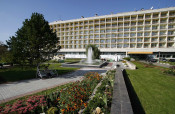
The Presidential Library resources are now available on the outskirts of Moscow
Today, November 3, 2017, a remote electronic reading room of the Presidential Library opened in the “Podmoskovye” United Sanatorium within the jurisdiction of the Department of Presidential Affairs of the Russian Federation. An event made possible in accordance with the cooperation agreement between the institutions, signed on October 31, 2017.
Director of the Moscow Regional Center of Access to Information Resources of the Presidential Library Peter Tishchenko, representatives of the Northeastern vicariate of the Moscow (city) diocese of the Russian Orthodox Church, Zaborevsky Secondary School and other officials have attended the opening ceremony.
Guests and staff employees of the sanatorium received a chance to get familiar with multimedia materials, giving an idea of the full range of the Presidential Library services. Currently, anyone granted the full access to the library stock. To date, it contains more than 580 thousand entries. Among rare visual materials there is a good deal of photographical postcards. Guests of the “Podmoskovye” can find out how the sanatoriums looked like in the middle of the XX century, considering digital copies of postcards with pictures of health resorts of Sochi, Zheleznovodsk, Kislovodsk, Gelendzhik, Crimea, etc.
The access centers to the library’s resources are already successfully functioning in some other institutions associated with the Department of Presidential Affairs of the Russian Federation. Among them are the united sanatoriums “Sochi,” “Rus,” “Dagomys” Complex of Health Resorts and the Central State Medical Academy.
To date, the Presidential Library has opened more than 400 remote access centers in all 85 regions of the country. Apart from an access to the extensive array of the Presidential Library stock, users also have a chance to remotely participate in the cultural, educational, outreach and awareness raising activities of the institution in video conferencing mode. In addition, over 30 remote electronic reading rooms operate in 27 countries, including Germany, the United States, Italy, Spain, Austria, and the United Kingdom on the basis of Russian centers of science and culture or the national libraries.

